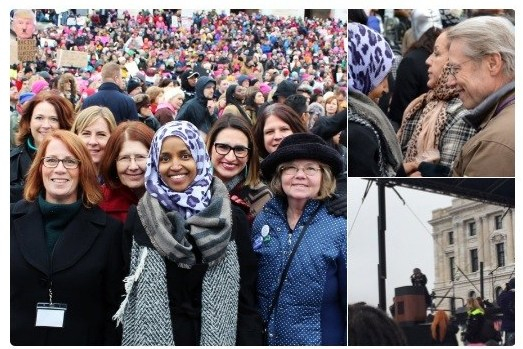
On Saturday January 21st the Women’s March on Washington took place in order to protest the potential effects the election of president Donald Trump would have on women’s rights in the USA. Conceived of by women, organised by women, networked and shared by women and overwhelmingly attended by women, the Women’s March became a chance for women worldwide to join in solidarity with their American sisters, and march for women’s rights in towns and cities all over the world. And this is what women did, in large numbers and in many places.
It is quite clear from the pictures that this was a women’s event, though it was by no means exclusionary – anyone could attend, but the focus was on women. In the UK for example there were many feminist and women’s groups represented:
It was a powerful opportunity to get across whichever feminist message meant the most to you, or whichever feminist campaign you have been working with, or simply to register your opposition to sexism. Although not all the signs and placards at the march were overtly feminist in nature, they were overwhelmingly so. Some of the subjects of inequality that women marched for included sexism, objectification and the sex trade, reproductive rights, political representation, violence against women and girls, women’s health and childcare. The other issues represented included racism and homophobia which obviously affect men too, and climate change and poverty which affect women disproportionately, as women bear the brunt of world poverty and the effects of climate change. I am trying to get across here the fact that even though there were some men present at the march, and even though some of the issues represented concern men too, you would have to be wilfully blind to ignore the fact that this was a women’s march, about women’s issues.
So why did the BBC do just that?
In the reports on BBC TV News on Saturday evening the march was referred to as an ‘anti-Trump’ march which was attended by lots of ‘people’. On BBC Radio 4 the same language was used, both on the Saturday evening and the Sunday morning news bulletins. We only got to learn that it was a ‘women’s march’ towards the end of the programme Broadcasting House, when one of the guest reviewers mentioned it. The choice of words really jarred after a day of following the march on social media and other news outlets, where the constant repetition of the words ‘women’s march’ had a feeling of power to it, which is a rare experience for women listening to the news. It felt as if the BBC had some kind of agenda. WHY was the word ‘women’ so dangerous to use?
Online it was a similar story, at least at first:
BBC online (thanks in part, I like to think, to a couple of tweets sent by myself and others…) changed their headline from ‘Anti Trump marches take place all over the world’ to ‘Women’s marches take place all over the world’. So thanks for that BBC. A small victory.
If the marches were just that: ‘anti Trump’, then I wonder why so many women came out the whole world over, in countries far and wide, none of which actually have Trump as their president? It doesn’t take much analysis to see that it was not Trump himself that the rest of the female world was protesting against, but the attitude towards women represented by Trump – an attitude which unfortunately can still be found all over the world, and which women still have to deal with on a day to day basis. The election of Trump acted as a catalyst for a powerful outpouring of dissatisfaction everywhere with the current state of women’s equality. The specific problems vary from culture to culture, but the strength of feeling is the same, and the election of Trump gave us a rallying point to express it.
It was not only the BBC which seemed intent on erasing the women from the Women’s March. Transactivists too were less than happy with the emphasis on the female population, particularly the biological aspects of being a woman:
Transactivism has been getting more and more extreme of late (the more it’s been allowed to get away with stuff…?) but this is a new low. Now we are being led to believe that simply HAVING A FEMALE BODY AND MENTIONING IT is transphobic and cissexist.
All women are now in the wrong.
Remind you of anything?
This is what happens when you allow men to dictate what you can and cannot say about your own body and your own experience. Women must simply disappear from the story in order not to hurt the feelings of trans people, and if we don’t do that we are wilfully contributing to their oppression. So it’s difficult, because we’re nice. We’ve been socialised to be nice. We don’t want to hurt anyone do we?
We need to wake up to this as women. On the one hand we have all that power and energy out there. We were funny and creative. We got angry. We did a good march:
On the other hand we are standing by when the very words we have to describe ourselves and our lived experience are being taken away from us. It has been happening for a while: Green Party Women call us ‘non-men’, to Sussex Police we are anyone who ‘self-identifies’ as a woman, to Planned Parenthood in the US we are ‘menstruators’ and to some people we are literally anyone who ‘doesn’t identify as male’:
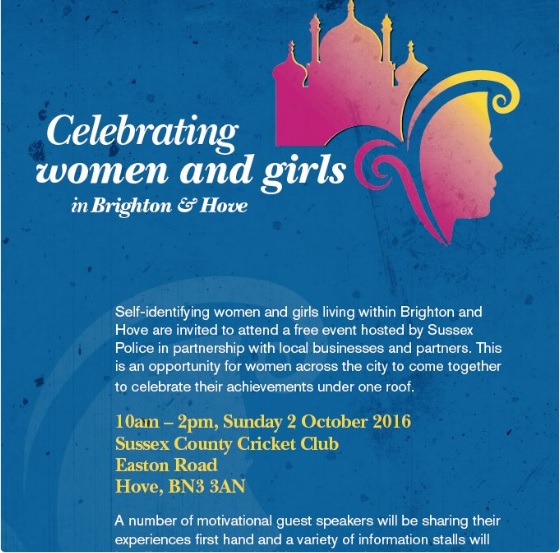
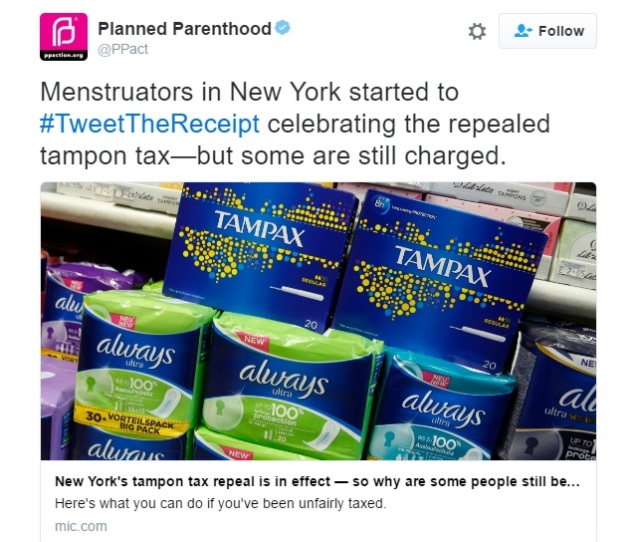

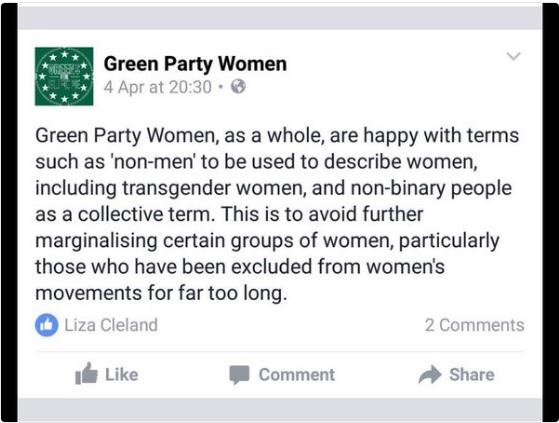
It’s time for women to wake up and stop being nice. The Women’s March felt like a celebration of how brilliant women are and what it looks like when we get angry. We should be more angry and we should be able to name the reasons for our anger. I hope the Women’s March has sown the seeds for further action and more awareness, but to be able to fight for your rights you need to be aware of how they are being eroded and who is doing the eroding.
It’s as if the BBC has sent a memo round saying ‘The word Woman is only to be used when it’s a case of a transwoman being done for murder or assault. Otherwise the word People will be sufficient. Woman’s Hour can apply for an exemption to this if and when it’s necessary.’
The trans lobby seems determined to erase all words to do with women, especially the biological ones, and many organisations have already capitulated. We now have birthing parents instead of mothers and chest feeding instead of breast feeding, amongst many more examples.
Is the timing coincidental or is the BBC’s choice of language meant to appease the trans lobby?
Women often find it hard to say no to men, but we really have to now. Current legislation around ‘gender identity’ will harm women and benefit men, and our ability to talk about this, let alone organise against it, is being eroded by the same ideology which is harming us in the first place. The downgrading of ‘sex’ as a category in favour of ‘gender identity’ has this one very important result: instead of the axis of oppression being male/female ( where 49% of the population who are male oppress 51% of the population who are female) the axis is being changed to cis/trans (where 99.97% of the population who are ‘cis’ oppress 0.03% of the population who are trans). It’s a clever way for men to say they are being oppressed by women, and it’s a reason we must all reject the category of ‘cis’ which only ever functions as a means to make us feel guilty when we assert our female rights, and to obscure the sex-based oppression we suffer. If 51% of the population cannot name their body parts for fear of upsetting the 0.03% this is an obvious and overwhelming injustice. You’d think.
The other result of this new language is that everything previously fought for on the axis of sex oppression becomes de-sexed, or, in common parlance, gender-neutral. It’s a tactic used by Men’s Rights Activists, for obvious reasons: if you can argue that domestic violence for example affects men almost as much as it affects women you can grab some of that (woefully inadequate) funding for yourself. Regarding trans people, if you can argue that transwomen (and particularly transwomen of colour) are the most oppressed of all then you have to give them priority treatment to compensate. Which is, I suppose, how two male-born speakers, one a self-confessed rapist and the other an apologist for child sexual exploitation, got to be two of the speakers at the Women’s March:
To get back to something positive, here is a reminder of the wonderful job women made of the Women’s March on Saturday:
And now let’s ensure that the complaints resulting from the Women’s March are seen for what they are: an attempt to silence and erase women. The (frankly ludicrous) assertion of trans rights over women’s rights, in response to the Women’s March, should be a wake up call to all of us.
If we don’t tackle this now then next time we need a protest march we may not even be allowed to call it a Women’s March.
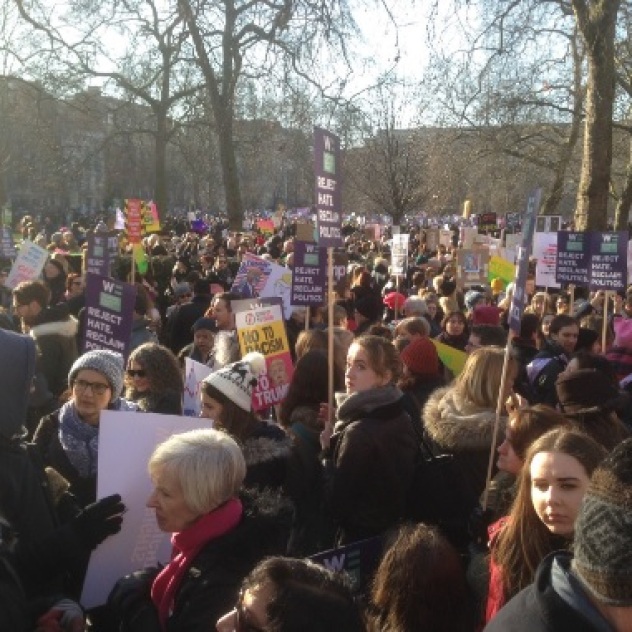
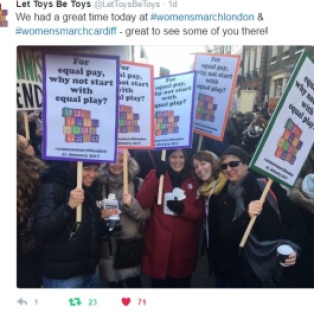
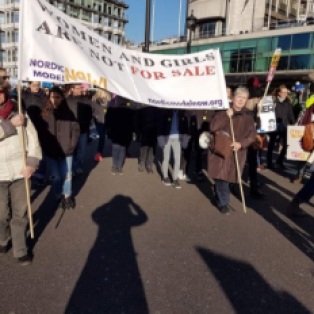


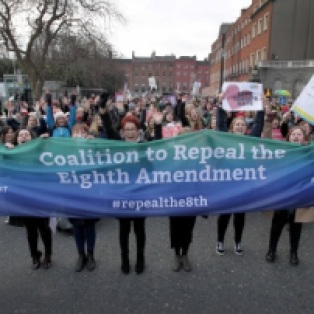




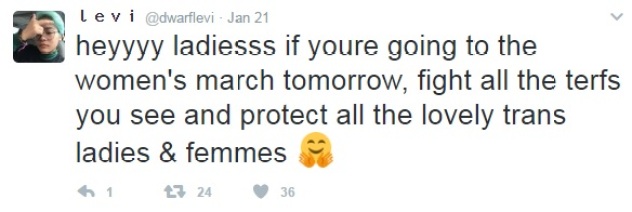









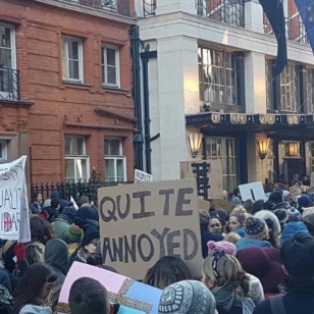

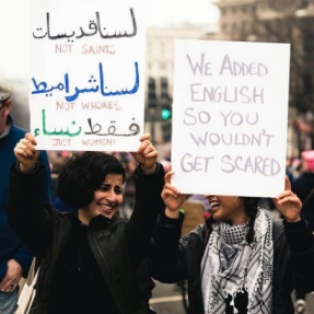

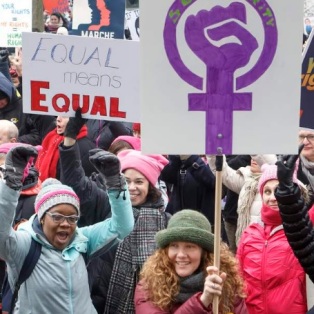


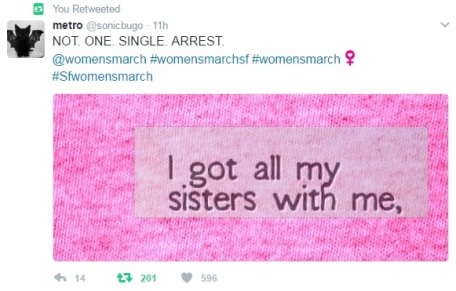




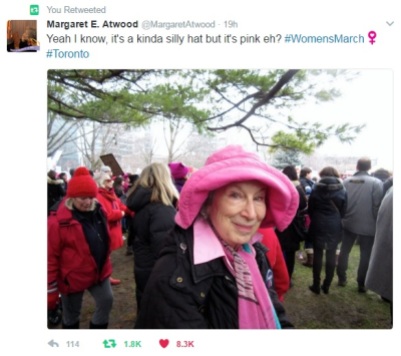


Reblogged this on A butterfly's diary and commented:
Great post that reminds us how important it is to carry on fighting for our rights following the predictable response by trans activists. These women’s marches were powerful, even for those of us who couldn’t attend, because they sent such a strong message. It is the reason they are being attacked so relentlessly. It gives me some hope.
Reblogged this on Siren Press.
Thanks for this, a succinct and brilliant analysis of Saturday! The tactics of transactivists parallel the Trumpism we protested on Saturday: a small minority of vociferous bullies who gain traction through frightening people.
One minor typo on here, it should be 99.97%, not 99.07%. I shared this article and someone pointed it out. Incredible read and very important to share. Thank you!
Thank you! Now corrected. Thanks for sharing, I think so many women out there have no idea what’s going on (judging by the cavalier way they wore their pussy hats with obviously NO IDEA why that might be #problematic…)
Great to see sisterhood is back.
Such a good article. It’s about time the balance was restored. I’m a staunch supporter of human rights for women, men and transpeople, but claim the right to be visible as the woman I am.
Reblogged this on FeistyAmazon and commented:
Great article about the Wpmens March which YES I ATTENDED AND GOT INTERVIEWED, FRONT PAGE NEWS!!!SISTERS STANDING UP FOR OURSELVES!!